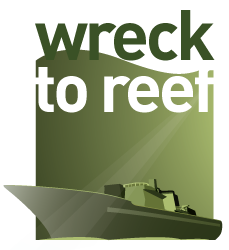As previously reported, at the end of June the Dorset County Council democratically voted to take a lease from Crown Estate for the W2R Project and to then sub-lease to W2R. This has been the biggest hurdle that we are likely to encounter and it is a huge relief that it is now behind us.A further development can be reported today with the announcement that the Local Action Group, Chalk and Cheese, has through their executive committee agreed a grant of £111,000 to W2R for the capitol costs of two of the three lobster restocking reefs and help with 3 years management costs.Chalk and Cheese are the Dorset body whose task it is to distribute European funding to community projects such as the W2R Project.The W2R Project has evolved since its inception two years ago. Started originally as a way of re-invigorating the ailing local dive industry by sinking a ship as a diver attraction, interest was shown from a number of bodies which include The Southern Sea Fishery District, Southampton University Oceanographic Department, Bristol University and the Environment agency.This has resulted in establishing an artificial reef sanctuary measuring 1 kilometre square which will include 2 scuttled ships, 3 lobster restocking reefs and one environmental reef.The ships will be ex Royal Naval Vessels and the scuttling date for the first of these is to be October 2011. The second will be scuttled 4 years later. Funding for the first ship has already been offered by a Portland based salvage operator.
The 3 lobster restocking reefs will be designed to accommodate juvenile lobsters during their various stages of growth until adulthood. In a plan worked up in conjunction with the Southern Sea Fishery District, 6,000 juvenile lobsters will be placed on the reefs each year in order to maintain the commercial fishery. The idea is for those lobsters to grow to adulthood, migrate out into the wider environment and then breed. It is estimated that this will seed at least a 50 mile stretch of the South Coast. This scheme will form part of a comprehensive management plan rolled out by the Southern Sea Fishery District.The third and largest lobster restocking reef will be comprised and funded by bereavement balls. These will be manufactured ‘in house’ by W2R and promoted as an environmentally sensitive way of remembering a loved one. The idea of creating new life from old is a noble one and the inclusion of a persons cremated ashes within a bereavement ball which then becomes part of a memorial reef also gives relatives somewhere to come back to in order to pay their respects and to see the evolution of marine life within the reef, year on year.
An environmental reef built of artificial reef balls will be established in order to enhance the marine flora and fauna of the area. These are similar in construction to bereavement balls but larger, each one standing some 2 metres tall. This reef will be funded by individual commercial companies sponsoring an artificial reef ball. Much like the scuttled ships, this reef will be available for individual divers and also club participation in monitoring the evolution of marine colonisation within the reefs, or quite simply to look and enjoy at leisure.
Apart from the W2R Project being the first artificial reef ‘area’ or ‘sanctuary’- call it what you will – to be established in Britain, the concept of an area of seabed being managed by the community for the community is a departure from the norm. Usually this is the domain of single issue groups such as a conservation body. We at W2R see no good reason why the people that use, enjoy and prosper from an area should not be the managers and custodians of that area. In our case the W2R Consultative Group will include the diving industry, commercial fishermen, Southern Sea Fishery District, local councils, Southampton Uni., Bristol Uni., The Coastguard, local hoteliers and charter boat operators.
This concept has grabbed the attention and help of Tom Appleby, an Academic Maritime Lawyer and lecturer at Bristol University who is watching the W2R Project with interest. You never know, this may become the way forward as a more cohesive way of managing our coastal waters and its recourses.
Best Regards.
Neville Copperthwaite.



No comments yet.